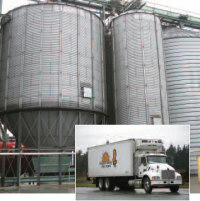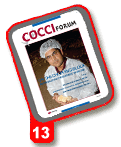New Strategy To Reduce In-Feed Medication
Passive immunity a viable strategy for Canada's Dr. Neil Ambrose

Those who know Neil Ambrose
know that he's passionate about
chicken production. In addition
to growing chicken on his own farm
located nearby Abbotsford, BC, Dr.
Ambrose is the Director of Veterinary
Services for Sunrise Farms, BC and
Alberta. This is why he's constantly
looking for management practices that
are effective and economical and that
also meet the challenges of an evolving
industry and new market standards.
Currently, Ambrose is conducting
trials on his farm to identify an alternative
program to Canadian in-feed medications.
This follows European regulatory
changes to eliminate all in-feed
medications. "Canadian regulations
often follow what happens in Europe,
so I want to be proactive and develop
a program that can successfully grow
chickens on a non-medicated feed
basis," explains Ambrose.
After initial trials with disappointing
results, Ambrose was introduced to a
new strategy based on using Coccivac-
B vaccine plus maternal antibody
induced by an experimental vaccine
developed by Schering-Plough Animal
Health in order to tackle both coccidiosis
and necrotic enteritis. He then initiated
a two-flock trial with this new passive
antibody strategy and got encouraging
results that are now inspiring him
to evaluate the program without any
backup from in-feed medication.
Off to a rough start
Ambrose's first trial attempts to reduce dependency on in-feed medications focused on controlling coccidiosis. He replaced in-feed anticoccidials with Coccivac-B vaccine, while continuing to use an in-feed antibacterial for necrotic enteritis control. This program was applied for six consecutive trial flocks and achieved mixed results. Although clinical coccidiosis was controlled, each flock did experience outbreaks of mild necrotic enteritis that resulted in increased mortality and reduced daily weight gain. It's important to note that the traditional wheatbased ration given to birds during the trials probably had a negative impact on results because it usually predisposes birds to greater necrotic enteritis, and that each bout of necrotic enteritis coincided with a normal feed change.
Vaccine plus passive immunity:
a new vaccine approach
After these six flocks, Ambrose
returned to his regular in-feed antibacterial
and anticoccidial program for
three flocks. It was during this period
that Schering-Plough Animal Health
consulting veterinarian, Dr. Linnea J.
Newman, learned of his trials and introduced
him to a new strategy, which
included Coccivac-B plus passive
immunity from a new vaccine to control
necrotic enteritis.
Recently registered for use in the
U.S., this new necrotic enteritis vaccine
is administered to the breeder hen,
which then passes the antibodies on to
the broiler chick, potentially eliminating
the need for in-feed antibacterials.
Ambrose's interest in developing a production
program for control of coccidiosis
and necrotic enteritis without
the use of medicated feed made his
farm an ideal candidate for Schering-
Plough Animal Health to test progeny
from flocks vaccinated with the new
vaccine in addition to Coccivac-B vaccine.
Getting chicks off on the right foot

After a three-flock break, Ambrose initiated
a two-flock trial with Coccivac-B
and passive immunity from the new
vaccine developed by Schering-Plough
Animal Health. Broiler chicks from vaccinated
parents and carrying antibodies
against necrotic enteritis were placed
on Ambrose's farm. In the first two trials,
he eliminated all in-feed anticoccidials
but maintained a reduced level
of in-feed antibacterials as insurance.
"We kept a low level of antibacterial in
the feed because I wasn't ready to risk
pulling the plug completely on the first
two trials," explained Ambrose.
With the adoption of the new passive
immunity program, Ambrose also
wanted to ensure the chicks got off to
the best start possible. This is where his
nutritionist Dan Moody of Ritchie Smith
Feeds stepped in. "When you go the
vaccination route there are a lot of management
factors you need to consider,"
explains Moody. "Vaccines work to
improve the birds' immune system by
challenging them with the disease. The
outcome provides birds with antibodies
and the ability to stand on their own
and perform well. But, there are other
factors that contribute to good performance,
and feed is one of them."
This fit well with Ambrose's disease
management philosophy, which says
that in addition to appropriate use of
medications and vaccines, beating coccidiosis
and necrotic enteritis also
requires strict attention to diet and barn
management.
Ambrose had been feeding a traditional
wheat-based ration with in-feed
medication for both coccidiosis and
necrotic enteritis. With the new vaccine
trial, Ambrose, working with Moody,
modified the diet to ensure a good start
and to reduce the chance of creating a
gut environment which would foster
the proliferation of Clostridium perfringens,
the necrotic enteritis-causing bacterium.
A specific starter ration was developed
by Moody to include the best
available ingredients. The ration was
more expensive than other standard
starters, but would help ensure the
broiler chicks got off to a healthier
start, achieving a heavier seven-day
weight.
The grower ration was also modified
from a 100% wheat base to a 70:30
wheat:corn mix. "Wheat has been
shown to predispose birds to greater
necrotic enteritis because it changes the
gut pH, increasing gut viscosity,"
explains Ambrose. "Higher gut viscosity
creates an ideal environment for C.
perfringens to grow, and increases the
potential of necrotic enteritis development.
Corn doesn't have this impact on
gut viscosity, so we decided to formulate
it into the diet."
When reformulating the diet, the
goal was to include more digestible
products that are better utilized by the
birds. Feed components, such as protein,
that are not totally utilized in a
ration often end up in the lower gut,
creating an optimal food source to support
the growth of C. perfringens.
Moody and Ambrose also formulated
the new grower ration to replace
part of the soybean meal with highly
digestible soybean concentrates, in
order to reduce indigestible sugars.
They also opted for higher quality
meals to lower the overall protein content
and reduce protein passage to the
lower gut. "This new diet, in combination
with passive immunity from the
new trial vaccine is how we were tackling
necrotic enteritis," he says.
Ambrose also firmly believes that
effective coccidiosis control makes
necrotic enteritis management easier.
To ensure he receives the best
Coccivac-B vaccine performance,
Ambrose also refined application methods
at Fraser Valley Chick Sales, the
Sunrise Farms hatchery which supplies
his chicks, to help optimize vaccine
application. Working with Schering-
Plough Animal Health rep Lionel
Gibbs, Ambrose replaced the hatchery's
single nozzle vaccine applicator
with the Spraycox double nozzle spray cabinet.
Coccivac-B rotation boosts in-feed anticoccidial efficiency
Research has shown a consistent boost in feed conversion efficiency and
weight gain when producers rotate back to in-feed medications after three
flocks with Coccivac-B vaccine.
Ambrose's trials provide more proof of this rotation's success. His birds
benefited from this rotation effect almost by accident. After completing his
first six trials with Coccivac-B and an in-feed antibacterial, he took a break,
rotating back into three in-feed medicated flocks. During this three flock
break, he observed rewarding rotation results.
"The first two flocks back on medicated feed had extremely good feed efficiency,"
says Ambrose. "This is because the Coccivac-B vaccine used on
the previous six flocks renewed the sensitivity of the oocyst strains in the
barn to the in-feed coccidiostats. The first flock back on medicated feed in
particular had a significant boost in weight gain and feed conversion, but
we also noticed continued above-average performance in the second flock
as well."
A rotation program using Coccivac-B vaccine can help producers 'cleanout'
their barns and bring back the efficacy of the anticoccidials. This rotation
is effective because Coccivac-B vaccine seeds the house with oocysts
that were isolated in the 1950s, before the anticoccidials used by most producers
today were developed. When producers rotate back to their in-feed
anticoccidial, its efficacy is restored, improving chicken perfomance.
By applying Coccivac-B vaccine on an angle from two sides, the new double nozzle system achieves a more uniform application across a box of chicks compared to the single nozzle, which applies from directly above.
Results encouraged the next trials to be free of in-feed medication
The two trial flocks showed a definite
improvement. Gaining confidence from
the success of the first two trials,
Ambrose has completed two more successive
flocks on his farm without any
in-feed medication. The first flock was
grown in one house, while the other
house used traditional in-feed anticoccidials
and antibiotics. At the end of the
day, the antibiotic-free flock finished at
0.03 kg ahead of the traditional flock
and half a day earlier, with similar mortality
in both flocks. The second ABF
flock was also paired with a traditional
flock and finished a full day ahead at
0.01kg (0.022046 lb) heavier than the
traditional flock. Mortality after the first
week remained normal in the ABF
flock in spite of high early chick mortality.
The flock even experienced
unusually severe weather during the
growout period. Severe weather can
often trigger necrotic enteritis outbreaks.
The flocks were grown at the
same density, but the ABF flocks had
the advantage of the specially formulated
feed.
According to Ambrose, "Incorporating
passive antibody from the new
experimental vaccine with Coccivac-B
vaccine provides a promising solution
for drug-reduced production in broiler
chickens." In fact, Sunrise Farms has
been so encouraged by the results on
Ambrose's farm that they have challenged
Ambrose to train Sunrise Farm
managers and service personnel in the
management techniques necessary to
make drug-reduced broiler production
economically feasible. Enhanced management,
specially formulated feeds
and a passive antibody from the new
experimental vaccine may enable producers
to produce economical antibiotic-
free broilers in the near future.







